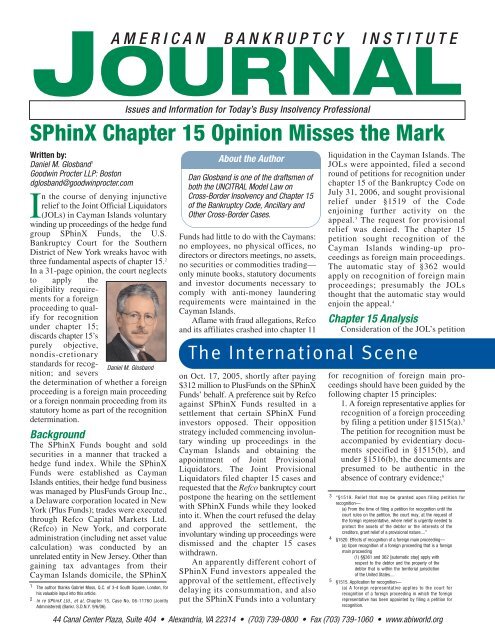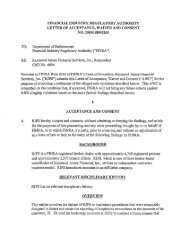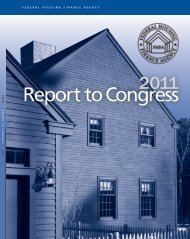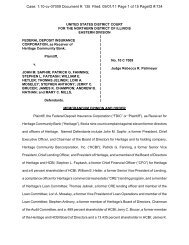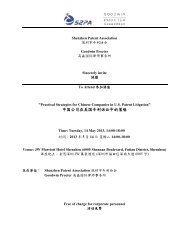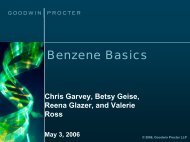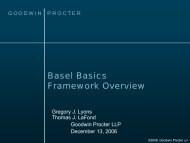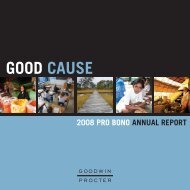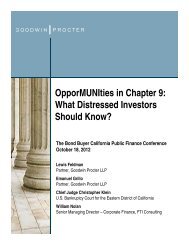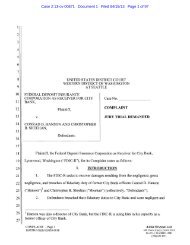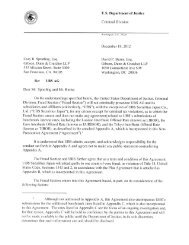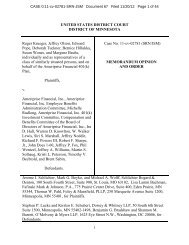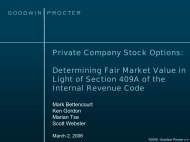SPhinX Chapter 15 Opinion Misses the Mark - Goodwin Procter LLP
SPhinX Chapter 15 Opinion Misses the Mark - Goodwin Procter LLP
SPhinX Chapter 15 Opinion Misses the Mark - Goodwin Procter LLP
Create successful ePaper yourself
Turn your PDF publications into a flip-book with our unique Google optimized e-Paper software.
AMERICAN BANKRUPTCY INSTITUTE<br />
JOURNAL<br />
Issues and Information for Today’s Busy Insolvency Professional<br />
<strong>SPhinX</strong> <strong>Chapter</strong> <strong>15</strong> <strong>Opinion</strong> <strong>Misses</strong> <strong>the</strong> <strong>Mark</strong><br />
Written by:<br />
Daniel M. Glosband 1<br />
<strong>Goodwin</strong> <strong>Procter</strong> <strong>LLP</strong>: Boston<br />
dglosband@goodwinprocter.com<br />
In <strong>the</strong> course of denying injunctive<br />
relief to <strong>the</strong> Joint Official Liquidators<br />
(JOLs) in Cayman Islands voluntary<br />
winding up proceedings of <strong>the</strong> hedge fund<br />
group <strong>SPhinX</strong> Funds, <strong>the</strong> U.S.<br />
Bankruptcy Court for <strong>the</strong> Sou<strong>the</strong>rn<br />
District of New York wreaks havoc with<br />
three fundamental aspects of chapter <strong>15</strong>. 2<br />
In a 31-page opinion, <strong>the</strong> court neglects<br />
to apply <strong>the</strong><br />
eligibility requirements<br />
for a foreign<br />
proceeding to qualify<br />
for recognition<br />
under chapter <strong>15</strong>;<br />
discards chapter <strong>15</strong>’s<br />
purely objective,<br />
nondis-cretionary<br />
standards for recognition;<br />
and severs<br />
Daniel M. Glosband<br />
<strong>the</strong> determination of whe<strong>the</strong>r a foreign<br />
proceeding is a foreign main proceeding<br />
or a foreign nonmain proceeding from its<br />
statutory home as part of <strong>the</strong> recognition<br />
determination.<br />
Background<br />
The <strong>SPhinX</strong> Funds bought and sold<br />
securities in a manner that tracked a<br />
hedge fund index. While <strong>the</strong> <strong>SPhinX</strong><br />
Funds were established as Cayman<br />
Islands entities, <strong>the</strong>ir hedge fund business<br />
was managed by PlusFunds Group Inc.,<br />
a Delaware corporation located in New<br />
York (Plus Funds); trades were executed<br />
through Refco Capital <strong>Mark</strong>ets Ltd.<br />
(Refco) in New York, and corporate<br />
administration (including net asset value<br />
calculation) was conducted by an<br />
unrelated entity in New Jersey. O<strong>the</strong>r than<br />
gaining tax advantages from <strong>the</strong>ir<br />
Cayman Islands domicile, <strong>the</strong> <strong>SPhinX</strong><br />
1 The author thanks Gabriel Moss, Q.C. of 3-4 South Square, London, for<br />
his valuable input into this article.<br />
2 In re <strong>SPhinX</strong> Ltd., et al, <strong>Chapter</strong> <strong>15</strong>, Case No. 06-11760 (Jointly<br />
Administered) (Bankr. S.D.N.Y. 9/6/06).<br />
About <strong>the</strong> Author<br />
Dan Glosband is one of <strong>the</strong> draftsmen of<br />
both <strong>the</strong> UNCITRAL Model Law on<br />
Cross-Border Insolvency and <strong>Chapter</strong> <strong>15</strong><br />
of <strong>the</strong> Bankruptcy Code, Ancillary and<br />
O<strong>the</strong>r Cross-Border Cases.<br />
Funds had little to do with <strong>the</strong> Caymans:<br />
no employees, no physical offices, no<br />
directors or directors meetings, no assets,<br />
no securities or commodities trading—<br />
only minute books, statutory documents<br />
and investor documents necessary to<br />
comply with anti-money laundering<br />
requirements were maintained in <strong>the</strong><br />
Cayman Islands.<br />
Aflame with fraud allegations, Refco<br />
and its affiliates crashed into chapter 11<br />
on Oct. 17, 2005, shortly after paying<br />
$312 million to PlusFunds on <strong>the</strong> <strong>SPhinX</strong><br />
Funds’ behalf. A preference suit by Refco<br />
against <strong>SPhinX</strong> Funds resulted in a<br />
settlement that certain <strong>SPhinX</strong> Fund<br />
investors opposed. Their opposition<br />
strategy included commencing involuntary<br />
winding up proceedings in <strong>the</strong><br />
Cayman Islands and obtaining <strong>the</strong><br />
appointment of Joint Provisional<br />
Liquidators. The Joint Provisional<br />
Liquidators filed chapter <strong>15</strong> cases and<br />
requested that <strong>the</strong> Refco bankruptcy court<br />
postpone <strong>the</strong> hearing on <strong>the</strong> settlement<br />
with <strong>SPhinX</strong> Funds while <strong>the</strong>y looked<br />
into it. When <strong>the</strong> court refused <strong>the</strong> delay<br />
and approved <strong>the</strong> settlement, <strong>the</strong><br />
involuntary winding up proceedings were<br />
dismissed and <strong>the</strong> chapter <strong>15</strong> cases<br />
withdrawn.<br />
An apparently different cohort of<br />
<strong>SPhinX</strong> Fund investors appealed <strong>the</strong><br />
approval of <strong>the</strong> settlement, effectively<br />
delaying its consummation, and also<br />
put <strong>the</strong> <strong>SPhinX</strong> Funds into a voluntary<br />
liquidation in <strong>the</strong> Cayman Islands. The<br />
JOLs were appointed, filed a second<br />
round of petitions for recognition under<br />
chapter <strong>15</strong> of <strong>the</strong> Bankruptcy Code on<br />
July 31, 2006, and sought provisional<br />
relief under §<strong>15</strong>19 of <strong>the</strong> Code<br />
enjoining fur<strong>the</strong>r activity on <strong>the</strong><br />
appeal. 3 The request for provisional<br />
relief was denied. The chapter <strong>15</strong><br />
petition sought recognition of <strong>the</strong><br />
Cayman Islands winding-up proceedings<br />
as foreign main proceedings.<br />
The automatic stay of §362 would<br />
apply on recognition of foreign main<br />
proceedings; presumably <strong>the</strong> JOLs<br />
thought that <strong>the</strong> automatic stay would<br />
enjoin <strong>the</strong> appeal. 4<br />
<strong>Chapter</strong> <strong>15</strong> Analysis<br />
Consideration of <strong>the</strong> JOL’s petition<br />
The International Scene<br />
for recognition of foreign main proceedings<br />
should have been guided by <strong>the</strong><br />
following chapter <strong>15</strong> principles:<br />
1. A foreign representative applies for<br />
recognition of a foreign proceeding<br />
by filing a petition under §<strong>15</strong><strong>15</strong>(a). 5<br />
The petition for recognition must be<br />
accompanied by evidentiary documents<br />
specified in §<strong>15</strong><strong>15</strong>(b), and<br />
under §<strong>15</strong>16(b), <strong>the</strong> documents are<br />
presumed to be au<strong>the</strong>ntic in <strong>the</strong><br />
absence of contrary evidence; 6<br />
3 Ҥ<strong>15</strong>19. Relief that may be granted upon filing petition for<br />
recognition—<br />
(a) From <strong>the</strong> time of filing a petition for recognition until <strong>the</strong><br />
court rules on <strong>the</strong> petition, <strong>the</strong> court may, at <strong>the</strong> request of<br />
<strong>the</strong> foreign representative, where relief is urgently needed to<br />
protect <strong>the</strong> assets of <strong>the</strong> debtor or <strong>the</strong> interests of <strong>the</strong><br />
creditors, grant relief of a provisional nature....”<br />
4 §<strong>15</strong>20. Effects of recognition of a foreign main proceeding—<br />
(a) Upon recognition of a foreign proceeding that is a foreign<br />
main proceeding<br />
(1) §§361 and 362 [automatic stay] apply with<br />
respect to <strong>the</strong> debtor and <strong>the</strong> property of <strong>the</strong><br />
debtor that is within <strong>the</strong> territorial jurisdiction<br />
of <strong>the</strong> United States....<br />
5 §<strong>15</strong><strong>15</strong>. Application for recognition—<br />
(a) A foreign representative applies to <strong>the</strong> court for<br />
recognition of a foreign proceeding in which <strong>the</strong> foreign<br />
representative has been appointed by filing a petition for<br />
recognition.<br />
44 Canal Center Plaza, Suite 404 • Alexandria, VA 22314 • (703) 739-0800 • Fax (703) 739-1060 • www.abiworld.org
2. After notice and hearing, §<strong>15</strong>17<br />
dictates that <strong>the</strong> court must enter an<br />
order recognizing <strong>the</strong> foreign<br />
proceeding if <strong>the</strong> proceeding is a<br />
foreign main proceeding or a foreign<br />
non-main proceeding within <strong>the</strong><br />
meaning of §<strong>15</strong>02 and <strong>the</strong> petition<br />
meets <strong>the</strong> §<strong>15</strong><strong>15</strong> requirements;<br />
3. Both §§<strong>15</strong>02 and <strong>15</strong>17(b) state that<br />
a foreign main proceeding is one<br />
pending in <strong>the</strong> country where <strong>the</strong><br />
debtor has <strong>the</strong> center of its main<br />
interests (COMI), while a foreign<br />
non-main proceeding is one pending<br />
in a foreign country where <strong>the</strong> debtor<br />
has an establishment; 7<br />
4. <strong>Chapter</strong> <strong>15</strong> contains no definition<br />
of center of main interests, but<br />
contains a presumption that, in <strong>the</strong><br />
absence of evidence to <strong>the</strong> contrary,<br />
<strong>the</strong> debtor’s registered office is its<br />
COMI; 8 case law in Europe, to which<br />
regard must be had under §<strong>15</strong>08,<br />
establishes that <strong>the</strong> presumption can<br />
be rebutted by showing that <strong>the</strong> “head<br />
office” functions were carried out in<br />
a jurisdiction o<strong>the</strong>r than where <strong>the</strong><br />
registered office was located. 9<br />
5. Section <strong>15</strong>02 defines “establishment”<br />
as “any place of operations<br />
where <strong>the</strong> debtor carries out a<br />
nontransitory economic activity.”<br />
This definition (which is a little more<br />
widely expressed than that in <strong>the</strong> EC<br />
Regulation) arose from <strong>the</strong> rejection,<br />
in relation to <strong>the</strong> EC Regulation, of<br />
<strong>the</strong> presence of assets as a sufficient<br />
basis for taking local jurisdiction. 10<br />
Put concisely, <strong>the</strong>re must be a place<br />
of business for <strong>the</strong>re to be an<br />
6 §<strong>15</strong><strong>15</strong>(b) (b) A petition for recognition shall be accompanied by—<br />
(1) a certified copy of <strong>the</strong> decision commencing such foreign<br />
proceeding and appointing <strong>the</strong> foreign representative;<br />
(2) a certificate from <strong>the</strong> foreign court affirming <strong>the</strong> existence<br />
of such foreign proceeding and of <strong>the</strong> appointment of <strong>the</strong><br />
foreign representative; or<br />
(3) in <strong>the</strong> absence of evidence referred to in paragraphs (1)<br />
and (2), any o<strong>the</strong>r evidence acceptable to <strong>the</strong> court of <strong>the</strong><br />
existence of such foreign proceeding and of <strong>the</strong> appointment<br />
of <strong>the</strong> foreign representative.<br />
7 §<strong>15</strong>02. Definitions—<br />
(4) ‘foreign main proceeding’ means a foreign proceeding<br />
pending in <strong>the</strong> country where <strong>the</strong> debtor has <strong>the</strong> center of its<br />
main interests;<br />
(5) ‘foreign nonmain proceeding’ means a foreign<br />
proceeding, o<strong>the</strong>r than a foreign main proceeding, pending in<br />
a country where <strong>the</strong> debtor has an establishment;<br />
The basic definition of “foreign proceeding” is in §101(23), <strong>the</strong> general<br />
definition section of <strong>the</strong> Bankruptcy Code: “‘foreign proceeding’ means<br />
a collective judicial or administrative proceeding in a foreign country,<br />
including an interim proceeding, under a law relating to insolvency or<br />
adjustment of debt in which proceeding <strong>the</strong> assets and affairs of <strong>the</strong><br />
debtor are subject to control or supervision by a foreign court, for <strong>the</strong><br />
purpose of reorganization or liquidation.”<br />
8 §<strong>15</strong>16(c).<br />
9 Daisytek [2003] BCC 562; Ci4Net [2005] BCC 277; Collins & Aikman<br />
(Lawrence Collins J. <strong>15</strong> July 2005); Hettlage ZIP 20/2004 p.962;<br />
Mliekotej sro (“Parmalat Slovakia”), (Unrep, 14 June 2004, Municipal<br />
Court of Fejer/Szekesfehervar); MPOTEC GmbH [2006] BCC 681;<br />
Eurotunnel Finance Ltd. (Paris Commercial Court, 2 August 2006);<br />
<strong>Opinion</strong> of Advocate-General Jacob in Eurofood [2005] BCC 1,0201,<br />
paragraphs 111, 112.<br />
10 See Moss and Smith, “Moss, Fletcher and Isaacs: The EC Regulation on<br />
Insolvency Proceedings” at para. 8.26.<br />
“establishment.”<br />
<strong>Chapter</strong> <strong>15</strong> substituted a simple,<br />
objective standard for recognition in place<br />
of <strong>the</strong> subjective requirements of former<br />
§304, which was repealed. Section 304<br />
did not have a recognition requirement as<br />
a first step, but ra<strong>the</strong>r focused on whe<strong>the</strong>r<br />
relief should be granted to a foreign<br />
representative in light of issues such as<br />
just treatment of claim holders in <strong>the</strong><br />
foreign proceeding, fairness and<br />
convenience to U.S. creditors and <strong>the</strong><br />
order in which proceeds of <strong>the</strong> foreign<br />
estate would be distributed. In contrast,<br />
under chapter <strong>15</strong>, <strong>the</strong> court must initially<br />
determine whe<strong>the</strong>r <strong>the</strong> petition and <strong>the</strong><br />
accompanying documents meet <strong>the</strong><br />
requirements of §<strong>15</strong><strong>15</strong> and whe<strong>the</strong>r <strong>the</strong><br />
foreign proceeding meets <strong>the</strong> definitional<br />
requirements of §§<strong>15</strong>02 and <strong>15</strong>17. 11<br />
The legislative history of §<strong>15</strong>17<br />
emphasizes <strong>the</strong> streamlined approach:<br />
The decision to grant recognition<br />
is not dependent upon any<br />
findings about <strong>the</strong> nature of <strong>the</strong><br />
foreign proceedings of <strong>the</strong> sort<br />
previously mandated by §304(c)<br />
of <strong>the</strong> Bankruptcy Code. The<br />
requirements of this section,<br />
which incorporates <strong>the</strong> definitions<br />
in §<strong>15</strong>02 and §§101(23) and (24),<br />
are all that must be fulfilled to<br />
attain recognition. 12<br />
In addition, since foreign proceedings are<br />
eligible for recognition only if <strong>the</strong>y meet<br />
<strong>the</strong> definitional requirements of ei<strong>the</strong>r a<br />
foreign main proceeding or a foreign nonmain<br />
proceeding, <strong>the</strong>re can be no<br />
recognition without <strong>the</strong> concomitant<br />
determination of qualification as a main<br />
proceeding or a non-main proceeding: If<br />
<strong>the</strong> foreign proceeding is not pending in<br />
a country where <strong>the</strong> debtor has its COMI<br />
or where it has an establishment, <strong>the</strong>n <strong>the</strong><br />
foreign proceeding is simply not eligible<br />
for recognition under chapter <strong>15</strong>. As<br />
emphasized in <strong>the</strong> legislative history,<br />
recognition is a one step process that<br />
includes <strong>the</strong> designation of <strong>the</strong> foreign<br />
proceeding as main or nonmain:<br />
The drafters of <strong>the</strong> Model Law<br />
understood that only a main<br />
proceeding or a non-main<br />
proceeding meeting <strong>the</strong> standards<br />
of §<strong>15</strong>02 (that is, one brought<br />
where <strong>the</strong> debtor has an<br />
establishment) were entitled to<br />
recognition under this section.<br />
The Model Law has been slightly<br />
modified to make this point clear<br />
by referring to <strong>the</strong> §<strong>15</strong>02 definition<br />
of main and non-main<br />
proceedings, as well as to <strong>the</strong><br />
general definition of a foreign<br />
proceeding in §101(23). A<br />
petition under §<strong>15</strong><strong>15</strong> must show<br />
that proceeding is a main or a<br />
qualifying non-main proceeding<br />
in order to obtain recognition<br />
under this section. 13<br />
The <strong>SPhinX</strong> opinion tortures this<br />
simple concept under <strong>the</strong> guise of chapter<br />
<strong>15</strong>’s supposed “flexibility”:<br />
This flexibility is evident not only<br />
in <strong>the</strong> policy statement in<br />
§<strong>15</strong>01(a) but also in Bankruptcy<br />
Code §<strong>15</strong>22, which provides that<br />
<strong>the</strong> court may grant or modify<br />
interim relief under §<strong>15</strong>19 or<br />
additional relief under §<strong>15</strong>21<br />
“only if <strong>the</strong> interests of creditors<br />
and o<strong>the</strong>r interested entities,<br />
including <strong>the</strong> debtor, are sufficiently<br />
protected.” 11 U.S.C.<br />
§<strong>15</strong>22(a). 14<br />
Flexibility also is inherent in <strong>the</strong><br />
various forms of relief that <strong>the</strong><br />
court may grant, upon a proper<br />
showing, to a foreign representative.<br />
<strong>15</strong><br />
<strong>Chapter</strong> <strong>15</strong> also provides flexibility<br />
by acknowledging <strong>the</strong><br />
possibility of a concurrent plenary<br />
case under o<strong>the</strong>r chapters of <strong>the</strong><br />
Bankruptcy Code while a foreign<br />
proceeding is pending, permitting<br />
a foreign representative in a<br />
recognized foreign proceeding to<br />
commence (11 U.S.C. §<strong>15</strong>11) or<br />
participate in (11 U.S.C. §§<strong>15</strong>12,<br />
<strong>15</strong>23) such a case, and providing<br />
for cooperation and direct<br />
communication between <strong>the</strong><br />
bankruptcy court and foreign<br />
courts or foreign representatives<br />
and bankruptcy trustees and<br />
foreign courts or foreign representatives.<br />
16<br />
Finally, chapter <strong>15</strong> demonstrates<br />
its flexibility in provisions that<br />
permit <strong>the</strong> court to condition relief<br />
(11 U.S.C. §<strong>15</strong>22(b)) or modify<br />
previously granted relief in light<br />
of changed circumstances. 17<br />
13 H. Rep. 109-31, p. 114. §<strong>15</strong>01 states that chapter <strong>15</strong> is <strong>the</strong> United<br />
11 The foreign representative must also be a person or body that meets States adaptation of <strong>the</strong> UNCITRAL Model Law on Cross-Border<br />
<strong>the</strong> definitional requirements of §101(24): “a person or body, including Insolvency.<br />
a person or body appointed on an interim basis, authorized in a foreign 14 <strong>SPhinX</strong>, supra at p. 13.<br />
proceeding to administer <strong>the</strong> reorganization or <strong>the</strong> liquidation of <strong>the</strong><br />
<strong>15</strong><br />
debtor’s assets or affairs or to act as a representative of such foreign Id. at p. 14<br />
proceeding.”<br />
16 Id. at p. 14<br />
12 H. Rep. 109-31, p.114. 17 Id. at p. <strong>15</strong>.<br />
44 Canal Center Plaza, Suite 404 • Alexandria, VA 22314 • (703) 739-0800 • Fax (703) 739-1060 • www.abiworld.org
Flexibility in granting, modifying or<br />
denying relief and in communicating and<br />
coordinating among multiple proceedings<br />
is a hallmark of chapter <strong>15</strong>. All of <strong>the</strong><br />
above quotations support flexibility in<br />
<strong>the</strong>se areas, but none support a flexible<br />
approach to recognition. The perceived<br />
flexibility leads <strong>the</strong> court to wander from<br />
<strong>the</strong> narrow path to recognition, somehow<br />
finding a congressional intent to separate<br />
“recognition” from eligibility as a foreign<br />
main or foreign non-main proceeding:<br />
“Thus, in Bankruptcy Code §§<strong>15</strong>02(7),<br />
<strong>15</strong>04, and <strong>15</strong>17(a)(1) Congress separated<br />
<strong>the</strong> concept of ‘recognition’ from <strong>the</strong><br />
concept of ‘recognition as a foreign main<br />
(or non-main) proceeding’ under<br />
§<strong>15</strong>17(b).” 18 Yet §<strong>15</strong>02(7), ironically<br />
quoted in full by <strong>the</strong> court, directly refutes<br />
any idea of “separation” and defines<br />
“recognition” as “<strong>the</strong> entry of an order<br />
granting recognition of a foreign main<br />
proceeding or foreign nonmain<br />
proceeding under this chapter.” Nothing<br />
in <strong>the</strong> o<strong>the</strong>r sections cited by <strong>the</strong> court<br />
deviates from this unified approach.<br />
Severing recognition from <strong>the</strong><br />
application of <strong>the</strong> definitional<br />
requirements of foreign main proceedings<br />
and foreign non-main proceedings results<br />
in <strong>the</strong> court ignoring whe<strong>the</strong>r <strong>the</strong> <strong>SPhinX</strong><br />
Funds “are foreign proceedings that are<br />
eligible for chapter <strong>15</strong> recognition. The<br />
court makes findings that <strong>the</strong> Cayman<br />
Islands proceedings are ‘foreign<br />
proceedings’ under Code §101(23) and<br />
that <strong>the</strong> JOLs were appointed to<br />
administer <strong>the</strong> debtors’ winding up under<br />
<strong>the</strong> Companies Law and authorizing <strong>the</strong>ir<br />
commencement of <strong>the</strong>se chapter <strong>15</strong> cases<br />
and thus <strong>the</strong> Cayman Islands proceedings<br />
are entitled to recognition.” 19 The court’s<br />
conclusion, however, fails to consider<br />
whe<strong>the</strong>r <strong>the</strong> foreign proceedings meet <strong>the</strong><br />
definitional requirements of §<strong>15</strong>02 as<br />
foreign main proceedings or foreign nonmain<br />
proceedings.<br />
Viewing <strong>the</strong> main/non-main determination<br />
as a separate step, <strong>the</strong> court<br />
meanders fur<strong>the</strong>r afield. Despite <strong>the</strong><br />
repeal of §304 and Congress’ confirmation<br />
that <strong>the</strong> subjective considerations<br />
of §304(c) no longer apply to<br />
a recognition decision, <strong>the</strong> court suggests<br />
that a determination of <strong>the</strong> debtor’s<br />
COMI should be guided by “<strong>the</strong> interests<br />
of <strong>the</strong> debtor’s estate, creditors and o<strong>the</strong>r<br />
parties, absent evidence that <strong>the</strong>y support<br />
21 Available at www.eu.int/eur-lex/pri/en/oj/dat/2000/l_160/<br />
l_16020000630en00010018.pdf. A determination by a court in an EC<br />
Member State (<strong>the</strong> EC Insolvency Regulation term for an EC country)<br />
that it has jurisdiction to open a main insolvency proceeding has 25 In re Tri-Continental Exchange Ltd., 2006 WL 2671336 (Bankr. E.D.<br />
a “primary” proceeding for an improper preemptive effect throughout <strong>the</strong> EC.<br />
Cal. 2006).<br />
purpose.” 20<br />
22<br />
Acknowledging <strong>the</strong> pre-<br />
§§<strong>15</strong>20-<strong>15</strong>22.<br />
26 If <strong>SPhinX</strong> Funds has assets in <strong>the</strong> United States that require<br />
23 Bondi v. Bank of America, N.A. (In re Eurofood IFSC Ltd.), Case 341/04, administration, a chapter 7 liquidation case can be filed. 11 U.S.C.<br />
18 Id. at p. 18.<br />
(para 33), 2006 E.C.R. __ 2006 WL 1142304 (E.C.J. May 2, 2006) §109(a).<br />
19 Id. at p. 20.<br />
[2006] BCC 397 (European Court of Justice).<br />
27 Id. at 24; Eurofood, supra. 2006 E.C.R. __ 2006 WL 1142304 (E.C.J.<br />
20 24 Id. at p. 16. See H. Rep. 109-31, p. 113. May 2, 2006).<br />
sumption that <strong>the</strong> debtors’ COMI is in <strong>the</strong><br />
Cayman Islands, where <strong>the</strong>y are<br />
registered, <strong>the</strong> court considers <strong>the</strong> types<br />
of factors that may be relevant to rebuttal<br />
of <strong>the</strong> presumption: Location of a debtor’s<br />
headquarters and those who manage its<br />
business, location of its primary assets,<br />
location of a majority of creditors, <strong>the</strong><br />
jurisdiction whose law would apply to<br />
most disputes. <strong>Chapter</strong> <strong>15</strong>’s flexibility, in<br />
<strong>the</strong> court’s view, requires that <strong>the</strong><br />
objective facts “should be viewed in light<br />
of chapter <strong>15</strong>’s emphasis on protecting<br />
<strong>the</strong> reasonable interests of parties in<br />
interest pursuant to fair procedures and<br />
<strong>the</strong> maximization of <strong>the</strong> debtor’s value.<br />
Because <strong>the</strong>ir money is ultimately at<br />
stake, one generally should defer,<br />
<strong>the</strong>refore, to <strong>the</strong> creditors’ acquiescence<br />
in or support of a proposed COMI.”<br />
The concept of COMI has its origin<br />
in Council Regulation (EC) No.<br />
1346/2000 of 29 May 2000 On<br />
Insolvency Proceedings of The Council<br />
of <strong>the</strong> European Union (EC Insolvency<br />
Regulation), where it plays a much more<br />
significant role. 21 Recognition as a foreign<br />
main proceeding under chapter <strong>15</strong> does<br />
not have dispositive jurisdictional<br />
implications among a community of<br />
countries, it just produces automatic<br />
effects under §<strong>15</strong>20 that can be modified<br />
for cause. Even if a foreign proceeding is<br />
recognized as a foreign non-main<br />
proceeding, relief identical to <strong>the</strong><br />
automatic effects can be granted on a<br />
discretionary basis. 22<br />
Under <strong>the</strong> EC Insolvency Regulation,<br />
objective factors ascertainable by third<br />
parties such as creditors dictate <strong>the</strong> COMI<br />
determination 23 and <strong>the</strong> repeal of §304<br />
was intended to introduce <strong>the</strong> same<br />
approach under chapter <strong>15</strong>. 24 The U.S.<br />
Bankruptcy Court for <strong>the</strong> Eastern District<br />
of California had no difficulty applying<br />
this approach to determine that St.<br />
Vincent and <strong>the</strong> Grenadines was <strong>the</strong><br />
COMI of insurance companies that<br />
conducted regular (albeit, fraudulent)<br />
business operations at <strong>the</strong>ir registered<br />
offices in Kingstown, St. Vincent. In<br />
rejecting a creditor’s argument that <strong>the</strong><br />
debtor’s COMI was <strong>the</strong> United States<br />
because most of <strong>the</strong> creditors were <strong>the</strong>re,<br />
<strong>the</strong> court looked to <strong>the</strong> EC Regulation for<br />
guidance as required by §<strong>15</strong>08. 25<br />
The objective facts found by <strong>the</strong><br />
<strong>SPhinX</strong> court, o<strong>the</strong>r than place of<br />
registration, put <strong>SPhinX</strong> Funds’ COMI in<br />
<strong>the</strong> United States. The objective facts did<br />
not show any “establishment” in Cayman<br />
Islands. This should have ended <strong>the</strong><br />
matter. The Cayman Islands proceeding,<br />
while a foreign proceeding, is not eligible<br />
for chapter <strong>15</strong> recognition at all. The<br />
foreign proceeding is not pending in a<br />
country where <strong>the</strong> debtor has <strong>the</strong> center<br />
of its main interests, thus it is not eligible<br />
for recognition as a foreign main<br />
proceeding under §<strong>15</strong>17(b)(1); <strong>the</strong> debtor<br />
has no establishment in <strong>the</strong> Cayman<br />
Islands, thus <strong>the</strong> foreign proceeding is not<br />
eligible for recognition as a foreign nonmain<br />
proceeding under §<strong>15</strong>17(b)(2). 26<br />
Instead of declining to enter <strong>the</strong> order<br />
of recognition, <strong>the</strong> court sought guidance<br />
on COMI determinations under <strong>the</strong> EC<br />
Insolvency Regulation. That trans-<br />
Atlantic inquiry should have resulted in<br />
a return to <strong>the</strong> application of objective<br />
factors but instead led to an incomplete<br />
discussion of a single case that <strong>the</strong><br />
<strong>SPhinX</strong> Funds court concluded “left open<br />
whe<strong>the</strong>r <strong>the</strong> presumption may be rebutted<br />
in respect of a debtor that conducts some<br />
business in <strong>the</strong> location where it is<br />
registered (even if, as in <strong>the</strong> case of <strong>the</strong><br />
<strong>SPhinX</strong> Funds, most, if not all, of that<br />
business pertains to maintaining its status<br />
as an entity registered in that location)...” 27<br />
In fact, <strong>the</strong>re is a relative abundance<br />
of authority under <strong>the</strong> EC Insolvency<br />
Regulation. As mentioned above, <strong>the</strong><br />
cases emphasize that <strong>the</strong> presumption<br />
based on <strong>the</strong> location of <strong>the</strong> registered<br />
office can be rebutted by pointing to<br />
objective facts ascertainable by outsiders<br />
such as creditors, usually <strong>the</strong> performance<br />
of “head office functions” in ano<strong>the</strong>r<br />
country. The present case is clearer on <strong>the</strong><br />
facts than any of <strong>the</strong> cases cited above,<br />
since no function whatsoever was<br />
performed in <strong>the</strong> Cayman Islands o<strong>the</strong>r<br />
than required formalities to stay registered<br />
<strong>the</strong>re and every o<strong>the</strong>r objective fact<br />
pointed to o<strong>the</strong>r jurisdictions, and in<br />
particular <strong>the</strong> United States.<br />
Following its brief trip to Europe, <strong>the</strong><br />
court returned to its subjective musings<br />
on COMI: Someone needs to manage <strong>the</strong><br />
debtors’ winding up, and no one has<br />
questioned <strong>the</strong> JOLs ability to accomplish<br />
44 Canal Center Plaza, Suite 404 • Alexandria, VA 22314 • (703) 739-0800 • Fax (703) 739-1060 • www.abiworld.org
<strong>the</strong> task fairly (although it is not clear<br />
from <strong>the</strong> opinion that <strong>the</strong>re is anything of<br />
substance in <strong>the</strong> Cayman Islands to be<br />
wound up); <strong>the</strong> winding-up proceedings<br />
will primarily affect investors who have<br />
not opposed <strong>the</strong> petition for recognition<br />
as a foreign main proceeding; <strong>the</strong>re are<br />
no o<strong>the</strong>r pending insolvency proceedings<br />
involving <strong>the</strong> debtors; Cayman Islands<br />
regulations require a winding up <strong>the</strong>re.<br />
Balancing all of <strong>the</strong>se factors, <strong>the</strong> court<br />
might be inclined to find <strong>the</strong> debtors’<br />
COMI in <strong>the</strong> Cayman Islands and<br />
recognize <strong>the</strong> proceedings as foreign main<br />
proceedings (noting, however, <strong>the</strong> limited<br />
practical effect of such recognition and<br />
<strong>the</strong> court’s ongoing duty to protect parties<br />
in interest).<br />
Notwithstanding that a simple<br />
“‘location of administration of <strong>the</strong><br />
debtor’s interests test’ could well result<br />
in a different outcome...because <strong>the</strong>se are<br />
liquidation cases in which competent<br />
JOLs under <strong>the</strong> supervision of <strong>the</strong><br />
Cayman court are <strong>the</strong> only parties ready<br />
to perform <strong>the</strong> winding up function, and,<br />
importantly, <strong>the</strong> vast majority of <strong>the</strong><br />
parties in interest tacitly support that<br />
approach, normally <strong>the</strong> court would<br />
recognize <strong>the</strong> Cayman Islands proceedings<br />
as main proceedings.” 28 The<br />
court <strong>the</strong>n reverses direction and declines<br />
to designate <strong>the</strong> <strong>SPhinX</strong> Funds foreign<br />
proceedings as foreign main proceedings<br />
because <strong>the</strong>y were filed for <strong>the</strong> improper<br />
purpose of obtaining <strong>the</strong> §362 automatic<br />
stay to block <strong>the</strong> appeal of <strong>the</strong> settlement:<br />
“Indeed, given that <strong>the</strong> JOLs did not<br />
articulate a proper basis, or even actively<br />
pursue a request, for any o<strong>the</strong>r relief<br />
under chapter <strong>15</strong>—for example, an<br />
injunction or turnover of property—with<br />
<strong>the</strong> exception of a request for fur<strong>the</strong>r<br />
discovery primarily relating to <strong>the</strong> appeals<br />
(transcript citation omitted), this litigation<br />
strategy appears to be <strong>the</strong> only reason for<br />
<strong>the</strong>ir request for recognition of <strong>the</strong><br />
Cayman Islands proceedings as foreign<br />
main proceedings.” 29 This analysis<br />
summons <strong>the</strong> ghost of §304 and is wholly<br />
irrelevant to a recognition decision, which<br />
is just a validation of <strong>the</strong> existence of <strong>the</strong><br />
foreign proceeding, its compliance with<br />
<strong>the</strong> definitional requirements of §<strong>15</strong>02<br />
and confirmation that <strong>the</strong> foreign<br />
representative also meets <strong>the</strong> definitional<br />
criteria.<br />
Conclusion<br />
In <strong>the</strong> end, <strong>the</strong> court’s deviations<br />
from <strong>the</strong> statute and congressional intent<br />
28 Id. at 27.<br />
29 Id. at 28.<br />
caused no harm to <strong>the</strong> <strong>SPhinX</strong> Funds<br />
parties. No stay of <strong>the</strong> appeal was<br />
entered and no o<strong>the</strong>r relief was granted.<br />
If recognition had been denied, as it<br />
should have been, <strong>the</strong> result would have<br />
been <strong>the</strong> same. However, <strong>the</strong>re may be<br />
great harm to <strong>the</strong> future of chapter <strong>15</strong><br />
if o<strong>the</strong>r courts follow <strong>the</strong> <strong>SPhinX</strong> Funds<br />
opinion. Recognition is not severable<br />
from <strong>the</strong> determination of <strong>the</strong> nature and<br />
eligibility of <strong>the</strong> foreign proceeding; <strong>the</strong><br />
petition for recognition and <strong>the</strong><br />
determination of <strong>the</strong> nature of <strong>the</strong><br />
foreign proceeding—main or nonmain—should<br />
be based on objective<br />
considerations. No flexible, subjective<br />
considerations should apply to <strong>the</strong><br />
decision to enter or decline an order of<br />
recognition. If an order of recognition<br />
enters because <strong>the</strong> foreign proceeding<br />
meets <strong>the</strong> objective requirements of<br />
§<strong>15</strong>17, requests for relief by <strong>the</strong> foreign<br />
representative and requests by creditors<br />
and o<strong>the</strong>r interested parties for<br />
protection or modification of relief<br />
require consideration of motives,<br />
interests, benefits and o<strong>the</strong>r subjective<br />
factors. At that point, <strong>the</strong> court will have<br />
<strong>the</strong> ability to act with <strong>the</strong> full range of<br />
flexibility that it has identified as<br />
informing chapter <strong>15</strong>.<br />
Finally, <strong>the</strong> judgment creates a wholly<br />
unnecessary, serious and regrettable<br />
breach with European case law on <strong>the</strong><br />
meaning of key concepts taken from a<br />
European statute. It threatens to break <strong>the</strong><br />
very unanimity that is meant to be at <strong>the</strong><br />
heart of <strong>the</strong> Model Law and <strong>the</strong> goal of<br />
uniform interpretation throughout <strong>the</strong><br />
world reflected in §<strong>15</strong>08. ■<br />
Reprinted with permission from <strong>the</strong> ABI<br />
Journal, Vol. XXV, No. 10, December/<br />
January 2007.<br />
The American Bankruptcy Institute is a<br />
multi-disciplinary, nonpartisan organization<br />
devoted to bankruptcy issues. ABI<br />
has more than 11,500 members,<br />
representing all facets of <strong>the</strong> insolvency<br />
field. For more information, visit ABI World<br />
at www.abiworld.org.<br />
44 Canal Center Plaza, Suite 404 • Alexandria, VA 22314 • (703) 739-0800 • Fax (703) 739-1060 • www.abiworld.org


